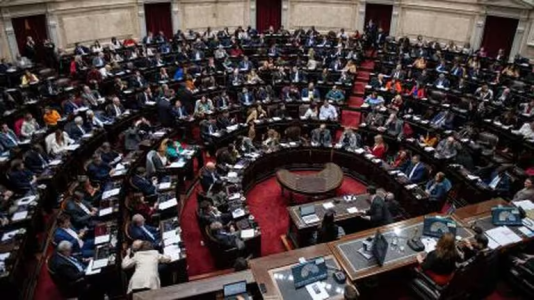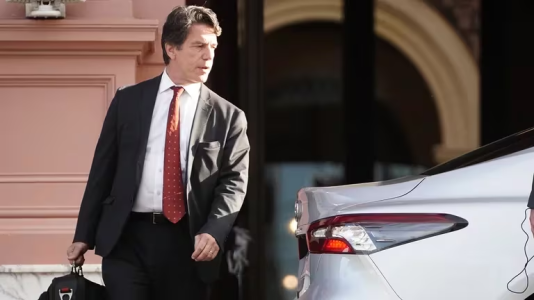marianoc
New member
The Government opens the debate on the Omnibus Law predisposed to modifications to achieve the support of the opposition - Infobae

Source:

 www.infobae.com
www.infobae.com
January 09, 2024
At 2 p.m. it will be discussed in three committees of the Chamber of Deputies. Unión por la Patria will not accompany the project. The UCR, Cordoba Peronism and the provincial blocs ask for changes to vote for it.
By Joaquín Múgica Diaz

The ruling party has 118 of its own deputies and would already be close to obtaining a quorum for Tuesday (Télam)
One month after the inauguration of Javier Milei, the national government launches the discussion of the Omnibus Law in Congress. The starting point of the parliamentary debate will be this Tuesday at 2 p.m., when the treatment is enabled in the three commissions through which the extensive project will go: General Legislation, Constitutional Affairs and Budget and Finance.
The first two are chaired by Gabriel Bornoroni from Córdoba and Nicolás Mayoraz from Santa Fe, both from the La Libertad Avanza (LLA) bloc. The third is chaired by deputy José Luis Espert, an ally of the Government, who last week had his first short circuit with the toughest sectors of the opposition, who questioned his appointment as head of the presidency of the commission.
On Wednesday and Thursday, the treatment of the project will begin at 9 in the morning and, according to what the ruling party expects, it will last throughout the afternoon. This Tuesday the Secretary of Energy, Eduardo Rodríguez Chirillo will be present among the 14 and 17, and the Minister of Justice, Mariano Cúneo Libarona, from 17 to 20.
On Wednesday the ministers will be there Guillermo Francos (Interior), Patricia Bullrich< a i=4> (Security) and Guillermo Ferraro (Infrastructure). On Thursday it will be Sandra Pettovello's turn (Human Capital) along with her secretaries. The idea is that each minister spends between two and three hours.

Nicolás Posse will not go to Congress to defend the Omnibus Law (Franco Fafasuli)
Absences are more prominent than presences. Nicolás Posse will not be there, nor will the Minister of Economy, Luis “Toto” Caputo. The first is a pure libertarian from the President's small table. The second was the minister who took the toughest and most profound measures regarding economic policy. There are two absentees with notice who were never in the folder.
It is possible that they will go second lines, because both, as official sources explained, “are immersed in the negotiation with the IMF.” An argument that serves to justify the failure, although it does not fully justify it, since the officials who make up the Fund's mission plan to leave Argentina tomorrow.
Until yesterday at 8 p.m. the deputies from all the blocks had time to send their questions to the officials, although without knowing who would be there. In principle, the secretaries and ministers would make a presentation and then answer the questions, although there is no defined outline. In LLA they hope that Peronism will go to the commissions to “put a spanner in the wheel” and the dialogue opposition to “remove doubts” with officials. This is how they divide the parliamentary political map.
In the ruling party they take for granted that the Unión por la Patria (UP) bloc, together with the Left, will not support any modification promoted by the Government, and that they will try to bog down the debate. “They have no will to debate. They are closed. On the other hand, there are other sectors of the opposition with a desire to compose, who are sending suggestions for the project," he said, when asked by Infobae, one of the libertarian legislators most involved in the negotiations to move the law forward.
In the Government they make a distinction between accepting suggestions and negotiating with the opposition. They assure that they are willing to receive modification proposals but that they are not negotiating. It is a very fine difference. Almost zero. Which is linked to the symbolic aspect of the speech. Although they do not whitewash it, some legislators accept that the difference is based on the idea that the term “negotiate” generates an image of weakness of the ruling party. Little things. Or, perhaps, little big things.
A representative allied to the Government defined that position in a paragraph: “The negotiation must be done when the opinion is ready, not before. With the debate in the race. You cannot agree to negotiate beforehand because otherwise they will destroy the project. "You can't change the entire law." Both in La Libertad Avanza and in the PRO they point to Peronism. “Now they are barefoot Carmelites and before this Congress was a notary office”, declared a libertarian representative.
The President reiterated his criticism of those who oppose it, demanding a segmented treatment of the content of the law. “It's because they want to bribe, that's why they want to break it up,” Milei insisted. The president of the Chamber of Deputies, Martín Menem, tried to lower the decibels yesterday: “What is not negotiated is the north, but suggestions to improve the road are accepted.”
The political signals of Milei's officials are more inclined to seek agreements than those of Milei himself, who wants to appear tough, convinced, intransigent and powerful. Container of the popular vote that, according to his understanding, legitimizes his actions. On the opposite side they claim that the ruling party is speculating with the support of the runoff voters and that when inflation begins to be felt, that support will disintegrate in a short time.

Source:

El Gobierno abre el debate de la Ley Ómnibus predispuesto a las modificaciones para lograr el apoyo de la oposición
A las 14 se tratará en tres comisiones de la Cámara de Diputados. Unión por la Patria no acompañará el proyecto. La UCR, el peronismo cordobés y los bloques provinciales piden cambios para votarlo
January 09, 2024
At 2 p.m. it will be discussed in three committees of the Chamber of Deputies. Unión por la Patria will not accompany the project. The UCR, Cordoba Peronism and the provincial blocs ask for changes to vote for it.
By Joaquín Múgica Diaz

The ruling party has 118 of its own deputies and would already be close to obtaining a quorum for Tuesday (Télam)
One month after the inauguration of Javier Milei, the national government launches the discussion of the Omnibus Law in Congress. The starting point of the parliamentary debate will be this Tuesday at 2 p.m., when the treatment is enabled in the three commissions through which the extensive project will go: General Legislation, Constitutional Affairs and Budget and Finance.
The first two are chaired by Gabriel Bornoroni from Córdoba and Nicolás Mayoraz from Santa Fe, both from the La Libertad Avanza (LLA) bloc. The third is chaired by deputy José Luis Espert, an ally of the Government, who last week had his first short circuit with the toughest sectors of the opposition, who questioned his appointment as head of the presidency of the commission.
On Wednesday and Thursday, the treatment of the project will begin at 9 in the morning and, according to what the ruling party expects, it will last throughout the afternoon. This Tuesday the Secretary of Energy, Eduardo Rodríguez Chirillo will be present among the 14 and 17, and the Minister of Justice, Mariano Cúneo Libarona, from 17 to 20.
On Wednesday the ministers will be there Guillermo Francos (Interior), Patricia Bullrich< a i=4> (Security) and Guillermo Ferraro (Infrastructure). On Thursday it will be Sandra Pettovello's turn (Human Capital) along with her secretaries. The idea is that each minister spends between two and three hours.

Nicolás Posse will not go to Congress to defend the Omnibus Law (Franco Fafasuli)
Absences are more prominent than presences. Nicolás Posse will not be there, nor will the Minister of Economy, Luis “Toto” Caputo. The first is a pure libertarian from the President's small table. The second was the minister who took the toughest and most profound measures regarding economic policy. There are two absentees with notice who were never in the folder.
It is possible that they will go second lines, because both, as official sources explained, “are immersed in the negotiation with the IMF.” An argument that serves to justify the failure, although it does not fully justify it, since the officials who make up the Fund's mission plan to leave Argentina tomorrow.
Until yesterday at 8 p.m. the deputies from all the blocks had time to send their questions to the officials, although without knowing who would be there. In principle, the secretaries and ministers would make a presentation and then answer the questions, although there is no defined outline. In LLA they hope that Peronism will go to the commissions to “put a spanner in the wheel” and the dialogue opposition to “remove doubts” with officials. This is how they divide the parliamentary political map.
In the ruling party they take for granted that the Unión por la Patria (UP) bloc, together with the Left, will not support any modification promoted by the Government, and that they will try to bog down the debate. “They have no will to debate. They are closed. On the other hand, there are other sectors of the opposition with a desire to compose, who are sending suggestions for the project," he said, when asked by Infobae, one of the libertarian legislators most involved in the negotiations to move the law forward.
In the Government they make a distinction between accepting suggestions and negotiating with the opposition. They assure that they are willing to receive modification proposals but that they are not negotiating. It is a very fine difference. Almost zero. Which is linked to the symbolic aspect of the speech. Although they do not whitewash it, some legislators accept that the difference is based on the idea that the term “negotiate” generates an image of weakness of the ruling party. Little things. Or, perhaps, little big things.
A representative allied to the Government defined that position in a paragraph: “The negotiation must be done when the opinion is ready, not before. With the debate in the race. You cannot agree to negotiate beforehand because otherwise they will destroy the project. "You can't change the entire law." Both in La Libertad Avanza and in the PRO they point to Peronism. “Now they are barefoot Carmelites and before this Congress was a notary office”, declared a libertarian representative.
The President reiterated his criticism of those who oppose it, demanding a segmented treatment of the content of the law. “It's because they want to bribe, that's why they want to break it up,” Milei insisted. The president of the Chamber of Deputies, Martín Menem, tried to lower the decibels yesterday: “What is not negotiated is the north, but suggestions to improve the road are accepted.”
The political signals of Milei's officials are more inclined to seek agreements than those of Milei himself, who wants to appear tough, convinced, intransigent and powerful. Container of the popular vote that, according to his understanding, legitimizes his actions. On the opposite side they claim that the ruling party is speculating with the support of the runoff voters and that when inflation begins to be felt, that support will disintegrate in a short time.

